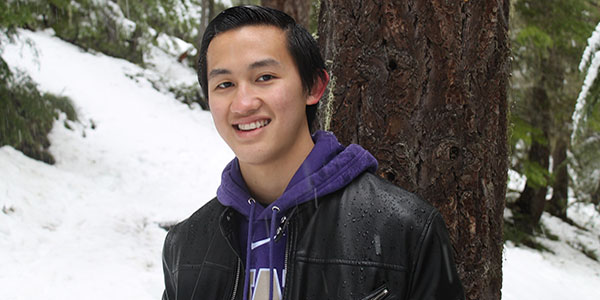UW Bioengineering sophomore Caleb Perez has received the 2014-15 UW Freshman Medal. The UW President annually presents the Freshman, Sophomore and Junior Medals for outstanding academic achievement. The Medalists demonstrate outstanding contributions to a world of good, and strong interdisciplinary interests in their academic, co-curricular and extracurricular activities.
The Freshman Medal is awarded to the sophomore having the highest scholastic standing for the first year of his or her course. The 2014-15 Medalists were recognized by UW President Ana Mari Cauce at a reception in March.
Caleb’s interest in bioengineering was inspired by his family’s history of health challenges. “We are no strangers to the impact of medicine, both its miracles and shortcomings,” he explains. He was particularly motivated by his grandfather, who suffered from acute heart disease.
“A heart transplant gave him the gift of eight additional years,” Caleb says. But in the eighth year following his transplant, he died after developing an untreatable infection caused by a minor fall. By pursuing a career in bioengineering, Caleb hopes to overcome health care challenges such as those experienced by his grandfather and other members of his family.
Becoming involved in bioengineering research has helped Caleb make progress towards this goal. “Medicine touches so many lives every single day, and research allows me to be at the forefront of it all,” he explains. He has participated in three internships through the NIH, and this summer will study at EPFL in Lausanne, Switzerland. Through one of his internships, he became involved in UW BioE Assistant Professor Ying Zheng’s lab. There, he became interested in regenerative medicine and tissue engineering.
Currently in the lab, he is characterizing differences in vascular permeability among heterogeneous endothelial cells. With this work, the lab hopes to develop a more accurate model of vessel permeability among vessels in the body, and investigate the changes in vascular structure and function that occurs in various diseases.
Caleb also participates in Bioengineers without Borders, a student group that develops low-cost, sustainable medical technologies while providing engineering design experience and professional development. He has teamed with other BwB students to develop a non-invasive diagnostic tool for measuring patient hydration levels. With their device, the team aims to address the wide-reaching impact of dehydration-related diseases. They particularly hope to alleviate diarrheal diseases leading to dehydration in children, which are a leading cause of death in the developing world.



